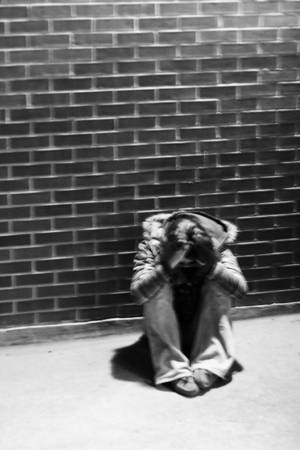MASTRE: Domestic violence is not love

Abusive relationships can often lead to a feeling of isolation and abandonment. Photo: Jon Lemons/Iowa State Daily
October 19, 2008
Last week was the YWCA’s Week Without Violence. It coincided with National Domestic Violence Awareness Month and was designed to get people imagining seven days without violence. For many of us that is an easy and hopeful task and the result, a picture-perfect world. For others, this is nearly impossible.
The YWCA ran workshops all week educating students about violence prevention and domestic assault. Hopefully some of you took those in. While you may not know someone in an abusive relationship right now, there’s a good chance you might later on in life.
Penny Rice, director of the Margaret Sloss Women’s Center, says that “domestic violence and relationship violence is beginning to happen in dating relationships and in high school.” A number of years ago, as I was finishing high school, it happened to me. I wound up in an abusive relationship, or rather, I didn’t even realize I was in one.
Of course, it didn’t start out that way. I thought I was smart enough to keep myself out of situations like that. But I was wrong. Before I knew it I was living life under a microscope. He started paying attention to my every move and even began waiting for me outside my classes. Consciously and unconsciously I started making decisions that wouldn’t piss my boyfriend off.
I stopped talking to and hanging out with certain people that he didn’t trust or feel that I was “safe” around. One by one I gave up my friends. The more I started to pull away from my family the more they pulled at me, causing more of a strain on my relationship. Though it was going on around me, I still didn’t have a sense that there was a problem. Then things got worse.
One day he threw me into a wall. I don’t remember why anymore. Another time he grabbed my hair and kept pulling on it because he thought I was out with someone else. Really, I had just forgotten my cell phone at home. He called twelve times and had left eight voicemails.
No matter how much I cried or argued with him, everything was always my fault. Doing things without him became impossible. If I did slip away by myself incessant questions always followed. I began to feel like a shell, solid on the outside but empty on the inside and very much a stranger to myself.
As the violence escalated, breaking up became a safety issue. It was terrifying to stay with him but the idea of leaving was even more frightening. Against his strength I was made to feel powerless which made escape seem impossible.
By now, several months had passed and I felt so cut off from the world I didn’t know how to get back to it. Thankfully a close friend of mine managed to stay with me and didn’t quite give up on me and my excuses.
One day he noticed a bruise on my arm. I casually mentioned who had given it to me and added the typical “but it was my fault, I made him mad” comment. We worked together at the time and he immediately let my manager know what was going on. With their intervention, my life started to turn around and slowly I began to realize where I ended up.
Because people stood up for me first, I was able to stand up for myself. I am not sure I would have been able to do so if it was the other way around. So, if you think you are in trouble or suspect that someone close to you is, then talk to someone. There are numerous Web sites out there with amazing resources designed to help. Here on campus, there is the Sloss House and residence hall CAs, for starters.
According to the Domestic Violence Intervention Program operating in Iowa, 20,000 to 44,000 women in the state are in abusive relationships. Nationally the numbers are even more staggering. The U.S. Department of Justice (cites that approximately 1.3 million women and 835,000 men are assaulted by an intimate partner each year. The justice department also reports that in 2005 in seven out of 10 female rape cases, the victims reported that their offender was a friend, relative or acquaintance.
It is not just women who suffer at the hands of abusers. No matter who you are, being controlled and manipulated is not a form of love. Similarly, imagining a week or a month without violence isn’t meant just to focus on domestic abuse but all forms of abuse from hate crimes to violence against men and children too.
So now that Domestic Violence Awareness Month is nearing a close has the world changed? Is it a better place? Hopefully for somebody it is. Trust your instincts — if you suspect there is something wrong there really might be.
— Erin Mastre is a graduate student in landscape architecture from Edmonton, Alberta, Canada.






